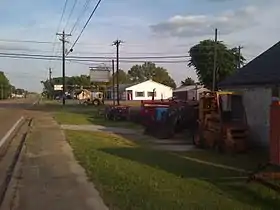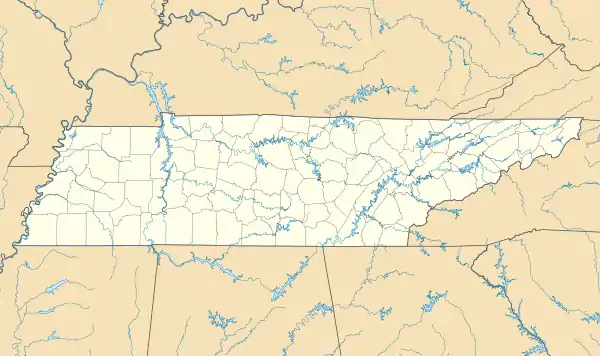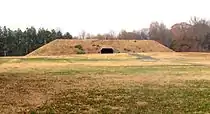Pinson, Tennessee
Pinson is an unincorporated community in Madison County, Tennessee. It lies along U.S. Route 45 between Jackson and Henderson, just north of the Chester County line, and State Route 197 also passes through the community. It is included in the Jackson, Tennessee Metropolitan Statistical Area.[1]
Pinson, Tennessee | |
|---|---|
 Pinson's small commercial strip in 2008 | |
 Pinson, Tennessee | |
| Coordinates: 35°29′24″N 88°43′14″W | |
| Country | United States |
| State | Tennessee |
| County | Madison |
| Elevation | 381 ft (116 m) |
| Time zone | UTC-6 (CST) |
| • Summer (DST) | UTC-5 (CDT) |
| Area code(s) | 731 |
Pinson is the site of the Pinson Mounds, the largest Middle Woodland period Indian mound group in the United States, and the Pinson Mounds State Archaeological Park dedicated to their study.[2]
History
In 1820, a group of five surveyors including Joel Pinson and Memucan Hunt Howard discovered a Middle Woodland period platform mound in the Pinson area while surveying land grants for Colonel Thomas Henderson. The surveyors dubbed the mound Mount Pinson after Joel,[3] and a post office was established there under that name in 1827.[4] In 1866, the post office was renamed "Pinson" with the foundation of the town of Pinson near the site of the mounds on land originally belonging to A. S. Rogers.[3][5]
Pinson High School was established in the area in 1873, and by 1875 had a student body of nearly 150 scholars.[6] Country music singer Eddy Arnold attended the school and performed locally during his early years.[7] The institution endured until it was consolidated into South Side High School with several other area schools in 1956.[8]
A destructive tornado struck Pinson on March 11, 1923, destroying 50 homes and killing at least 18 people.[9] It has since been estimated that the tornado was an F5 on the Fujita scale based on damage reports.[10][11]
Pinson Mounds

Pinson is the site of the Pinson Mounds, an extensive archaeological area including three distinct mound groups of the Middle Woodland period.[12] Covering 400 acres (1.6 km2), the area contains at least 30 mounds, 17 of which have been identified as being completely or partially constructed by prehistoric peoples.[13] They are located on an upland above the banks of the South Fork of the Forked Deer River, and are thought to have been originally constructed for religious ceremonial purposes.[14]
The mounds were discovered by surveyor Joel Pinson in 1820 but remained of only local interest until Smithsonian archaeologist William Edward Myer mapped the site in the 1880s.[12] It was officially made a Tennessee state park in 1974 after local citizens petitioned the state to purchase and preserve the land.[15] The park, officially the Pinson Mounds State Archaeological Park, spans 1,200 acres (4.9 km2) and is listed on the National Register of Historic Places.[16]
Notable people
- Eddy Arnold, country music singer that attended Pinson High School
References
- "OMB Bulletin No 08-01" (PDF). U.S. Census Bureau. November 2007. p. 36.
- Pinson Mounds State Archaeological Park at Tennessee.gov. Retrieved on May 18, 2006.
- Miller, Larry L. (2001). Tennessee Place Names. Indiana University Press. pp. 165–166.
- Tennessee Secretary of State. "Tennessee Place Names and Post Offices > Part 3 > J-O". Retrieved 6 October 2020.
- Tennessee Secretary of State. "Tennessee Place Names and Post Offices > Part 4 > P-S". Retrieved 6 October 2020.
- "Pinson High School Commencement". The Jackson Sun. 4 June 1875.
- Hollywood Walk of Fame. "Eddy Arnold". Retrieved 6 October 2020.
- "About South Side High School". Archived from the original on 23 July 2012. Retrieved 6 October 2020.
- "Tennessee and Kentucky Storm Dead Near 30". Nashville Tennessean. March 13, 1923. pp. 1, 8.
- Grazulis, Thomas P. (2001). F5-F6 Tornadoes. St. Johnsbury, Vermont: The Tornado Project.
- "US F4, F5 Tornadoes Since 1900". Castor Weather. Archived from the original on 2007-02-28. Retrieved 2011-04-10.
- Tennessee Encyclopedia. "Madison County". Retrieved 6 October 2020.
- Mark Norton, "The Pinson Mounds Complex," West Tennessee Historical Society Papers 55 (2001). Copy obtained at Pinson Mounds State Archaeological Park.
- Dean R. Snow, Archaeology of Native North America (2010), p. 93.
- "Pinson Mounds State Archaeological Park". Retrieved 6 October 2020.
- Tennessee Department of Tourist Development. "Pinson Mounds State Archaeological Park". Retrieved 6 October 2020.
